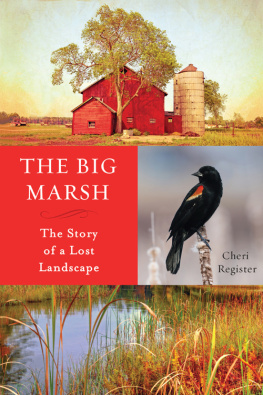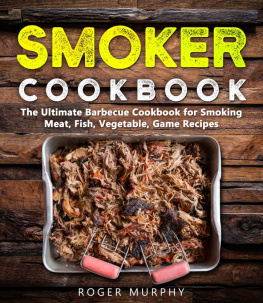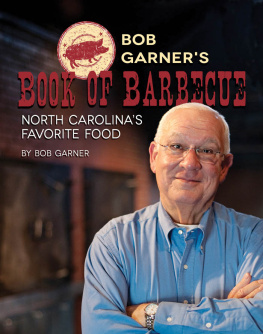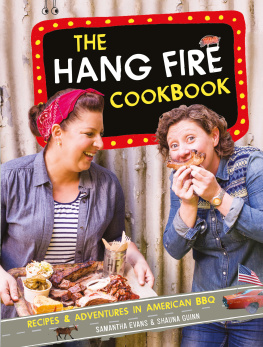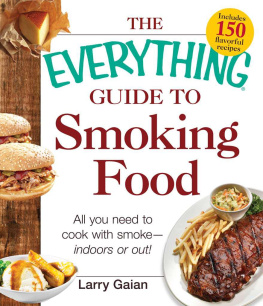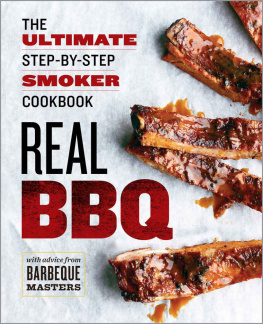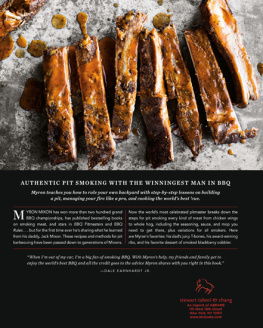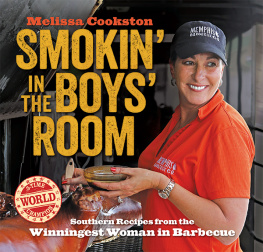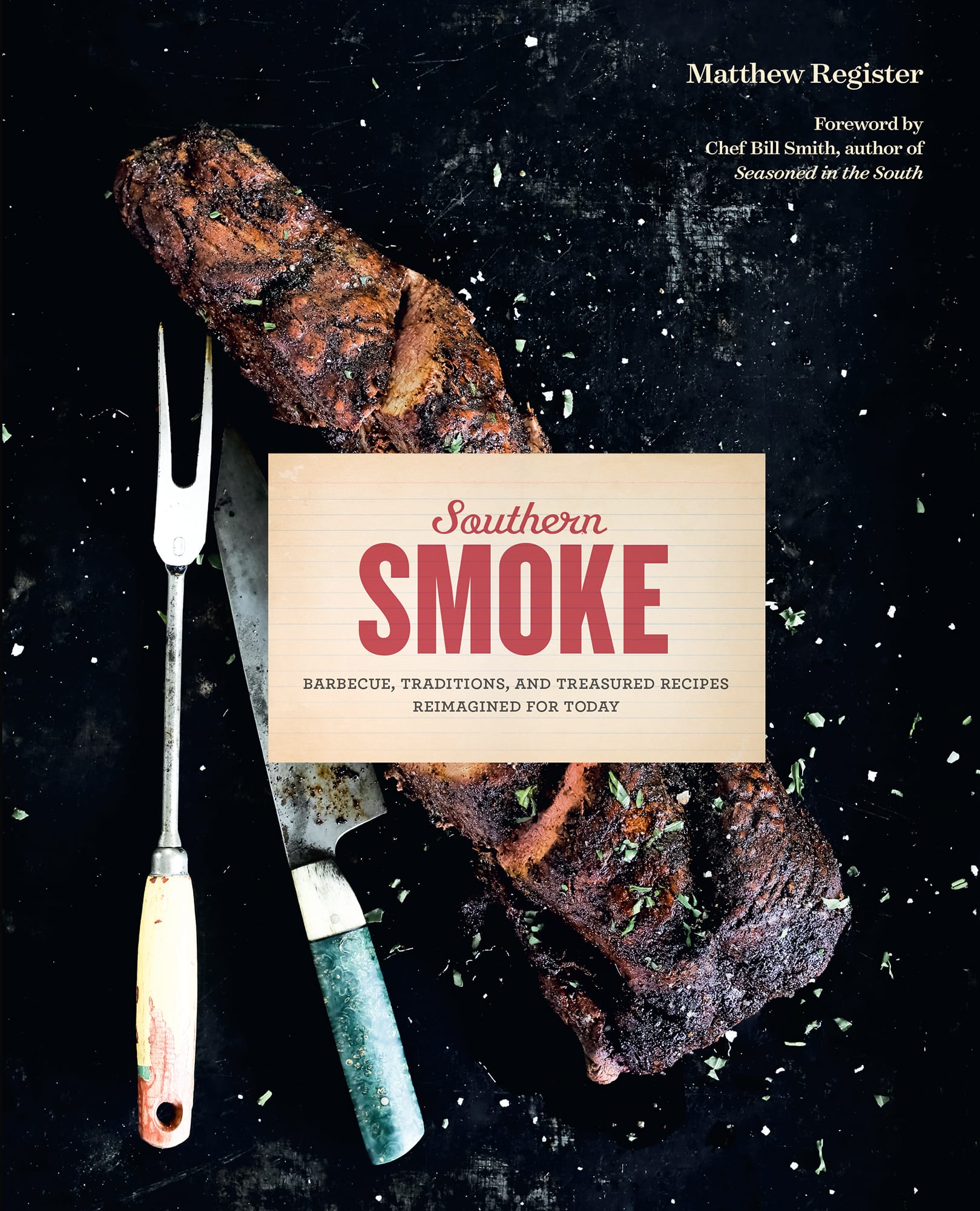Contents
Guide
Southern
SMOKE
BARBECUE, TRADITIONS, AND TREASURED RECIPES REIMAGINED FOR TODAY
Matthew Register

FOREWORD
A t Crooks Corner, weve been hosting a guest barbecue night for years. Every Wednesday, we invite pit masters to join us or send us some of their barbecue. Since barbecue is contentious here in North Carolina, like college basketball, we try to include restaurants from both the east and the west of the state in equal measure. Often, when Matthew sent us barbecue, he would also send one of his side dishes. The one that made me decide I needed to go from knowing of Matthew to meeting him was his collard chowder. It stopped me in my tracks. How come Ive never heard of this? I asked myself. It is so delicious. I need to know this guy
We finally did meet when Matthew and his sidekick, Rodolfo Sandoval, delivered a shipment in person. I immediately loved his point of view: the way he views his cooking and the way it informs how he lives his life. If thats hard to understand, just start reading. His philosophy comes through clearly in the pages of this book. He wants his guests to have a good time first of all, and he thinks that they should do that with good friends and food. (And it is really good food.)
Matthews restaurant kitchen, over in Garland, North Carolina, is tiny. You could spit across it, as my grandmother would have said, except that it would get in trouble with the health department if you did. I know this as I had the honor and the pleasure of being a guest chef at one of his Southern Supper Series events a few years back. His place at that time was mostly for takeout with a few picnic tables out front. But off to one side was a nice covered area that can seat a party and there was a food truck in the driveway. Best of all, there was a 1965 Ford that had been turned into a bar in the back. We climbed all over each other as we worked in the little kitchen, and that night a crowd gathered for supper. Matthews family was all theremostly as workersas were Rodolfos parents. Some local farmers and other neighbors stopped by. Rounding it out were food enthusiasts from further afield, who had discovered Matthews dinner parties. The menu included some of my food and some of his. It was a grand evening.
Because Im in a restaurant kitchen eighty hours a week, I never cook at home; if I did, I would use the recipes in this book to recreate some of what we cooked that night and to make my own barbecue (dream on). Id then follow Matthew on wonderful tangents: smoked turkey, all kinds of chicken, fried oystersall the things you might expect to find in a cool Southern barbecue shack. The collard chowder I remember so well is here. So are Merigold tomatoes, another recipe that made me want to meet this chef.
Matthew means for you to really use this book. He starts with the elemental, like in the Joy of Cooking, where they tell you how to boil water. For barbecue, that means he covers what kind of wood, temperatures, equipment, even the fun factor. No stone is left unturned.
After addressing our North Carolina barbecue and its embellishments in depth, he explores a few other regional cuisines of the South. First to the Low Country, with its sophisticated food traditions, and then to Memphis and the Delta region of Mississippi that adjoins itfavorite places of mine. Along the way are stories, opinions, and bits of history. Some of the recipes stick close to tradition, while others have been altered a little to suit modern tastes and times.
Finally, there is a splendid section on baking and desserts. If youll pardon me, this takes the cake. Besides standards like black pepper cornbread and buttermilk biscuits, you get your pick of pies: chocolate chess with pecans, sweet potato, buttermilk, coconut cream, peanut, chocolate fudge with sea salt, and then something called pecan pie bread pudding. He doesnt mess around.
Youre going to love this cookbook just make sure you try that collard chowder.
Bill Smith, Chef, Crooks Corner, Chapel Hill, and author of Seasoned in the South
INTRODUCTION
I didnt set out to become a chef. In fact, even once cooking all day was my full-time job, I was uncomfortable with the title. I didnt have a family lineage tracing back generations in the restaurant business. I didnt go to a fancy culinary school. As I saw it, I was just a guy from Garland who cooks barbecue for a living.
What Ive come to believe is that the titles arent all that important. You can call me chef or not, and it doesnt have an effect on the food I cook. Whats important to me is my relationship with food, family, and my customers. Looking back as far as I can remember, most of my memories involve food and the people gathered around the table. I love to revisit the smell of a whole hog that just finished cooking at our annual family get-together. Im still inspired by the crunchy deep-fried Spanish mackerel I first tasted as a teenager. Theres my first Delta tamale on a road trip through Mississippi, my first taste of true Italian gravy at a table next to my girlfriend (now my wife) heck, I can still remember the Bojangles chicken biscuit I ate just a few hours before my daughter, Taylor Grace, was born.
Okay, so Im a food-loving chef. But the way I see it, thats not at the top of the list. First and foremost, I am a barbecue guy. While most people now know me for Southern Smoke, the barbecue restaurant in Garland, North Carolina, my own barbecue journey started not in a restaurant but with a book: Holy Smoke: The Big Book of North Carolina Barbecue. In that book, John Shelton Reed, along with his wife, Dale, and William McKinney dove deep into the cultural significance and history of barbecue in my state. It inspired me to start my own barbecue journey, using traditional techniques that had fallen by the wayside. (Now that I know him, I often joke with John that if he hadnt written that book, I might not be in the barbecue business!)
I was soon obsessed, smoking in my backyard every chance I gotnot with the intention of opening a restaurant, but to preserve a small part of my history as a North Carolinian and to pass a skill down to my children. I sat up night after night in the rain, heat, and cold learning and trying to get better with each cook. As I began to get better at my craft, I started offering free barbecue to anyone who would take it. As the word began to spread, my phone began to ring from people wanting me to cook barbecue for them. Slowly but surely, I began to realize that maybe I could make a living doing something that I loved. While barbecue wasnt in my blood, it slowly became a part of my soul.


When I first started working on this book, I sat down with three important Southern men and asked the question: Why is cooking barbecue so important to us? What ensued was a wide-ranging discussion not just about cooking barbecue, but about the cultural significance in our communities. We talked about the hog-killing days, as they called it, where communities would begin early in the day and work until late at night preparing every usable part of the pig. We talked about how that was a real event and how barbecue as a hobby is still very much something to do with friends and family.


